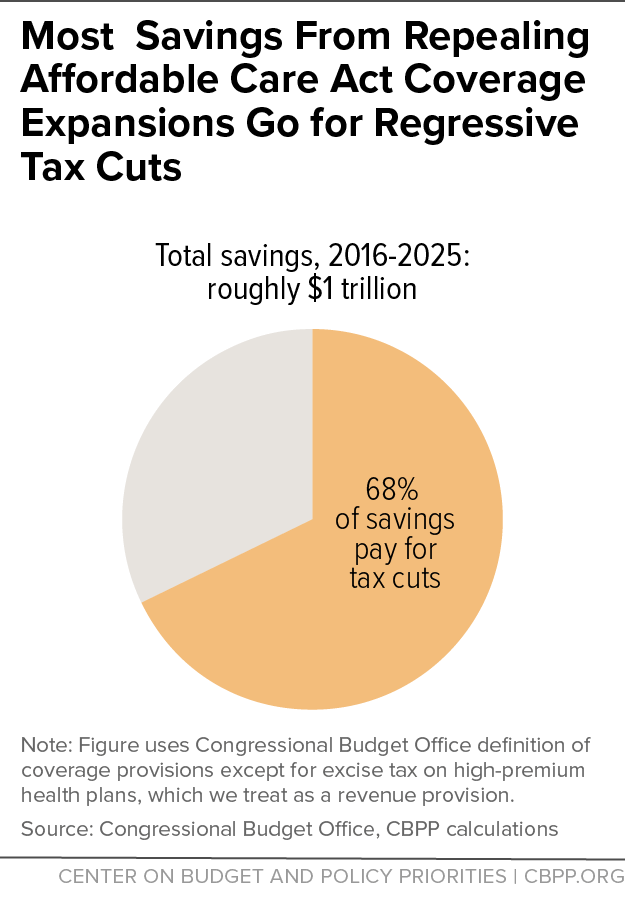BEYOND THE NUMBERS
Congressional Republicans’ planned approach to repealing the Affordable Care Act (ACA) wouldn’t leave enough funding for a replacement that provides at least comparable coverage to a similar number of people, our new paper explains. As a result, it would create pressure for radical changes in Medicaid and Medicare that could put millions of families with children, people with disabilities, and seniors at risk — on top of those who’d lose coverage from ACA repeal.
A repeal bill would eliminate the ACA’s coverage expansions and lead to the near-collapse of the individual insurance market, causing 30 million people to become uninsured, the Urban Institute estimates. But rather than devoting the savings from repeal to ensuring that millions of Americans don’t lose coverage, Republicans plan to use roughly two-thirds of this money to pay for tax cuts (see graph).
These tax cuts would provide the greatest benefits to the wealthy: people with incomes above $1 million would get annual tax cuts averaging over $50,000 apiece, the Tax Policy Center estimates. Drug companies and insurance companies would also get large tax cuts.
With two-thirds of the savings eaten up by these tax cuts, Republicans would need new ways to pay for any replacement bill — especially if they plan to fulfill Senate Majority Leader Mitch McConnell’s pledge to “do better” with respect to coverage than the ACA. Based on prior approaches in Republican budgets, they would likely turn to Medicaid and Medicare as their main source of savings to finance a “replacement” measure, creating tremendous pressure to radically restructure those programs.
For example, President-elect Trump, House Speaker Paul Ryan, and Health and Human Services nominee Tom Price have all supported converting Medicaid to a block grant or per-capita cap, in which the federal government gives states a fixed amount of funding as opposed to covering a fixed share of state Medicaid costs, as it does now. Funding would be set well below what states would get under current law, and the cuts would grow each year. Unless states raised their own Medicaid funding enough to compensate, they’d likely have to impose major cuts in coverage.
As for Medicare, House Republicans have issued plans to convert the program into a “premium support” system that would give each beneficiary a fixed-dollar payment, or voucher, to cover part of the cost of health insurance. The value of the voucher would rise more slowly than health care costs, shifting more costs to beneficiaries each year. Premium support would also undermine the sustainability of traditional Medicare over time as private plans entice healthier beneficiaries to leave traditional Medicare, leaving the pool in traditional Medicare sicker and thus costlier to cover. In addition, House Republicans have called for raising Medicare’s eligibility age from 65 to 67 and raising cost-sharing for many beneficiaries.

